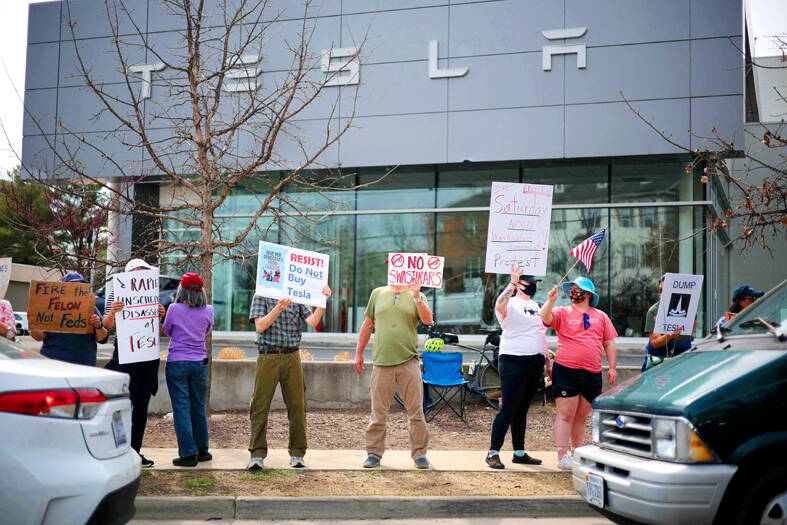Demonstrators descended on Tesla Inc dealerships across the US, and in Europe and Canada on Saturday to protest company chief Elon Musk, who has amassed extraordinary power as a top adviser to US President Donald Trump.
Waving signs with messages such as “Musk is stealing our money” and “Reclaim our country,” the protests largely took place peacefully following fiery episodes of vandalism on Tesla vehicles, dealerships and other facilities in recent weeks that US officials have denounced as terrorism.
Hundreds rallied on Saturday outside the Tesla dealership in Manhattan.

Photo: Getty Images via AFP
Some blasted Musk, the world’s richest man, while others demanded the shuttering of his so-called Department of Government Efficiency, which is dramatically slashing the US federal government.
Amy Neifeld, a 70-year-old psychologist who had not joined a protest since marching against the Vietnam War in the 1970s, said Musk was leading the country toward fascism.
“I’m Jewish, so I grew up with a great awareness of fascism,” she said. “And it has just gotten uglier and uglier” since Trump returned to the White House.
The protest was organized by the environmental activist group Planet Over Profit, which said “stopping Musk will help save lives and protect our democracy.”
In Washington’s posh Georgetown neighborhood, about 150 people gathered in a festive mood on an unseasonably warm day, dancing and cheering as passing cars honked.
Protests also took place in Florida, Massachusetts and California, as well as in European cities such as London, Berlin and Paris.
In Vancouver, where about 100 people protested at a Tesla dealership, one person in a dinosaur costume held a placard that said: “You thought the Nazis were extinct? Don’t buy a Swasticar.”
A small group of Americans held signs outside a Tesla dealership in the French capital, including one that read “Send Musk to Mars now.”
Musk and Trump “are destroying our democracy, not obeying the basic rules of our country and firing people at agencies that do very important work,” said Raf, 59, a Paris protester who did not wish to give his last name.
European sales of Tesla electric cars dropped 49 percent in January to February compared with the same period a year earlier, the European Automobile Manufacturers’ Association (ACEA) said on Tuesday last week.
Aging models are one factor behind the plunge so far this year, but electric vehicle clients might also be refusing to buy in protest against Musk since he became a key supporter of Trump.
New Tesla registrations in the EU fell to 19,046 in the first two months of the year, giving the company a market share of just 1.1 percent.
Last month alone, Tesla registrations were down 47 percent at 11,743, the ACEA said.
The sales drop came even as overall electric vehicle sales jumped 28.4 percent over the first two months to 255,489 — for an EU market share of 15.2 percent.
Asked for reaction to the protests, Tesla did not immediately respond.

South Korea’s equity benchmark yesterday crossed a new milestone just a month after surpassing the once-unthinkable 5,000 mark as surging global memory demand powers the country’s biggest chipmakers. The KOSPI advanced as much as 2.6 percent to a record 6,123, with Samsung Electronics Co and SK Hynix Inc each gaining more than 2 percent. With the benchmark now up 45 percent this year, South Korea’s stock market capitalization has also moved past France’s, following last month’s overtaking of Germany’s. Long overlooked by foreign funds, despite being undervalued, South Korean stocks have now emerged as clear winners in the global market. The so-called “artificial intelligence

NEW IDENTITY: Known for its software, India has expanded into hardware, with its semiconductor industry growing from US$38bn in 2023 to US$45bn to US$50bn India on Saturday inaugurated its first semiconductor assembly and test facility, a milestone in the government’s push to reduce dependence on foreign chipmakers and stake a claim in a sector dominated by China. Indian Prime Minister Narendra Modi opened US firm Micron Technology Inc’s semiconductor assembly, test and packaging unit in his home state of Gujarat, hailing the “dawn of a new era” for India’s technology ambitions. “When young Indians look back in the future, they will see this decade as the turning point in our tech future,” Modi told the event, which was broadcast on his YouTube channel. The plant would convert

‘SEISMIC SHIFT’: The researcher forecast there would be about 1.1 billion mobile shipments this year, down from 1.26 billion the prior year and erasing years of gains The global smartphone market is expected to contract 12.9 percent this year due to the unprecedented memorychip shortage, marking “a crisis like no other,” researcher International Data Corp (IDC) said. The new forecast, a dramatic revision down from earlier estimates, gives the latest accounting of the ongoing memory crunch that is affecting every corner of the electronics industry. The demand for advanced memory to power artificial intelligence (AI) tasks has drained global supply until well into next year and jeopardizes the business model of many smartphone makers. IDC forecast about 1.1 billion mobile shipments this year, down from 1.26 billion the prior

People stand in a Pokemon store in Tokyo on Thursday. One of the world highest-grossing franchises is celebrated its 30th anniversary yesterday.